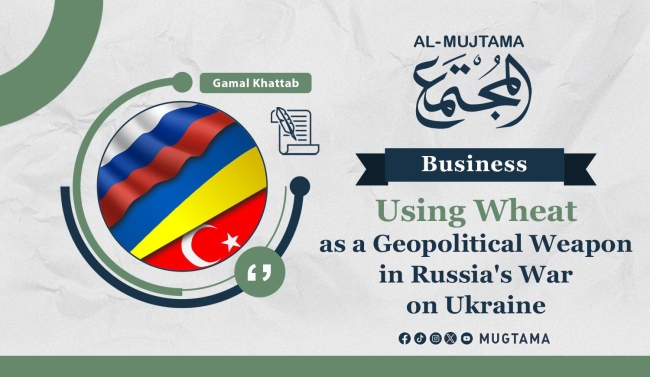Using Wheat as a Geopolitical Weapon in Russia's War on Ukraine
The use of wheat as a weapon in the Russian war on Ukraine, which began on February 24, 2022, and the repercussions of this use on the food and lives of people in the world, is a topic that has occupied many analysts and strategists.
One of the most tragic results of this war was the food shortage that affected both the poor and the rich after Ukrainian grain production declined, and farmers in this country faced real problems, whether in production or export, after they had been saving more than 5 million tons. of wheat per month.
Soil of Black Gold
Ukraine is one of the most important wheat-producing and exporting countries in the world, and its wealth is represented by its black soil, which is considered the best in the world. It is very fertile and is called the “soil of black gold,” as Laura Riley, a correspondent specializing in covering food news at the Washington Post, says.
According to Marco Ansaldo - a geopolitical expert and foreign correspondent in Turkey - food has been used as a geopolitical weapon in Russia's war on Ukraine.
In turn, the Executive Director of the United Nations World Food Program, David Muldrow Beasley, warned of the worst food crisis the world has witnessed since World War II, considering the use of wheat as a weapon “a declaration of war on global food security.”
The food crisis that resulted from Russia's war on Ukraine affected Arab countries such as Lebanon and Yemen, which was indicated by the Regional Director for the Middle East and North Africa at the World Food Program, Corinne Fleischer, when she said that Yemen imports 90% of its food needs, approximately 30% of which comes from the Black Sea. 16 million Yemenis cannot get enough food.
After the World Food Program was buying Ukrainian grains to feed the Third World, it now works to save Ukraine and distribute food to its population. The program says that 20% of Ukrainians are at risk of food insecurity.
Ukrainian Loses $6 Billion a Month
The food crisis came after the vital system of Ukrainian agriculture, represented by the huge grain silos in which the harvest ready for export from Ukraine to all parts of the world was stored, was damaged.
Dmitrasevich Markyan, Deputy Minister of Agricultural and Food Policy of Ukraine, confirmed that before February 24, 2022, the storage capacity was estimated at about 75 million tons of grain, and about 5 million tons were destroyed due to military actions.
He added that during the first weeks of the war, supply logistics chains inside Ukraine were hit, such as the delivery of flour and the delivery of raw materials for making bread.
The crisis worsened after the closure of the Black Sea ports and the Russian bombing of the port of Odessa, which was one of the most important seaports in the world, as it remained idle for several months.
According to statistics, the Ukrainian economy lost $6 billion per month due to the blockade of ports.
Türkiye's Role in Resolving the Grain Crisis
Türkiye and its President Recep Tayyip Erdogan played an important role in resolving the Ukrainian grain crisis, which geopolitical expert Marco Ansaldo pointed out by saying, “It must be recognized that the Turkish president has played a role that others have not played, as he takes advantage of his country’s geopolitical position well and places it at the heart of an image that arouses interest.” ", stressing that Turkey has always maintained its position between the two sides, as it communicates with Moscow and Kiev.
Cargo ships resumed their activity to export Ukrainian grains after the signing of the grain agreement on July 22, 2022 in Istanbul.
As of last October 30, more than 400 ships left Ukrainian ports on the Black Sea with a total tonnage estimated at 9 million and 700 thousand tons of agricultural products.
As of last September 14, 27% of ships headed towards third world countries and 47% towards rich countries, while exports to Lebanon and Somalia amounted to only 1%.
It is noteworthy that on July 17, 2023, Russia officially informed Turkey, Ukraine, and the United Nations Secretariat of its objection to extending the “grain deal,” which raises questions about the repercussions of this decision on grain prices - especially wheat - and on global food security in general.


